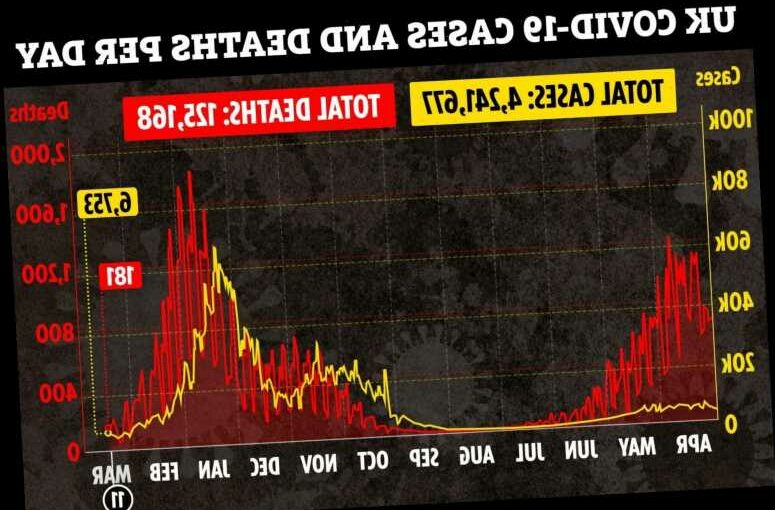THE number of people to die with Covid in the UK continues to drop – with fatalities at the lowest level of any Thursday so far this year.
A further 181 people were recorded to have died after battling the virus -a drop of 73 per cent on this time last month, when 678 people died.
🦠 Read our coronavirus live blog for the latest news & updates…
Meanwhile, a further 6,753 people tested positive overnight – a drop of 50 per cent on February 11, when 13,494 people were newly diagnosed.
In hospitals in England, a further 159 people lost their lives to the virus. The casualties were aged between 35 and 99, and all but 11, who were aged 64 to 91, had known underlying health conditions.
Nine more people died in Northern Ireland, while 22 further deaths were recorded in Scotland and 12 in Wales.
It comes as:
- Boris Johnson has warned of a new Covid surge in Europe – and vowed not to speed up easing lockdown
- Covid jabs 'will be rolled out for over-30s by April'
- Government officials have defended the £37bn Test and Trace system after an ex Treasury chief described it as “the most wasteful and inept public spending programme of all time”
- Scientists warn the super-infectious Kent mutation is up to twice as deadly as the original strain
- It was revealed A-level and GCSE exams will be easier in 2022 to help out students badly-hit by the pandemic
Health chiefs revealed today that Covid case rates are continuing to fall in all regions of England.
In Yorkshire and Humber, the rate of new cases stood at 97.6 per 100,000 people in the seven days to March 7 – the highest rate of any region, but down from 115.6 in the previous week.
South West England recorded the lowest rate – 32.3, down from 43.9.
Case rates are also plunging in all age groups, with people aged between 30 and 39 currently the most likely to test positive.
In three areas of England, no Covid cases have been recorded for months.
Retirement destination Sidmouth in Devon hasn't registered on the national database for infections in the past two months – while the Isles of Scilly has had no cases since September.
Elsewhere, rural Poundstock and Kilkhampton in north Cornwall last registered a case on January 6.
However, in 18 areas of England – six per cent of the country – infections are rising.
Currently, Derbyshire Dales has the highest rate in England, with 116 new cases recorded in the seven days to March 6 – the equivalent of 160.4 cases per 100,000 people.
That's a huge rise from 63.6 per 100,000 the previous week.
East Devon – a district just eight-and-a-half miles from Sidmouth – has also recorded a rise from 41.7 to 59.5.
Cases are rising in Canterbury in Kent, Craven in North Yorkshire and Uttlesford in Essex.
Boris Johnson has refused to speed up the easing of lockdown restrictions over fears cases could surge or new variants take root.
He said this week: "I think it's very important to have a timetable that is sensible, that is cautious, but one that is also irreversible."
And this afternoon, Public Health England experts said a new Covid variant has been found.
It has emerged after two people returned from Antigua to the south east of England.
No other cases have been found of this variant so far.
Experts have warned that any easing of measures will result in further deaths, even with the success of the UK's jabs roll-out.
England’s Covid hotspots
The worst-affected areas in the country this week are:
Derbyshire Dales, with a rate of 160.4 cases per 100,000 people
Hull: 152.8 per 100,000
Rotherham: 151.8 per 100,000
South Holland: 144.2 per 100,000
Barnsley: 142.6 per 100,000
Preston: 142.5 per 100,000
Bradford: 141.5 per 100,00
Peterborough: 140.9 per 100,000
Redditch: 137.2 per 100,000
South Derbyshire: 136.1 per 100,000
Sage scientist Professor Andrew Hayward, of University College London (UCL), said reopening schools, pubs and shops are "very big steps" and "we don't really understand what impact they will have on transmission".
He said there are "very sizeable numbers of people" who are "vulnerable to ending up in hospital and dying".
England's Chief Medical Officer Chris Whitty gave a similar warning this week – and said that no matter what happens, scientists believe there will be yet another wave.
Speaking at a hearing of the Science and Technology Committee, he said: "As things open up we will get a surge in the virus.
"Whether that happens, we hope not soon, but it might happen later in summer if we open gradually.
"All modelling suggests a further surge that will find people either not vaccinated or where the vaccine has not worked."
And his warning over a late summer surge came as Brits' hopes of foreign holidays this year were dealt a blow earlier after it emerged Wales is lobbying the PM to keep the international travel ban for months to come.
Welsh First Minister Mark Drakeford said the idea of people jetting off abroad from as early as mid-May "fills me with horror".
And he revealed he's urging No 10 to keep restrictions on going abroad in place across the whole summer.
Scotland is also pushing the PM to take a tougher stance on border controls to keep new variants of the virus out of the UK.
Under Mr Johnson's roadmap, international travel could be allowed again from as early as May 17.
But he is under pressure to postpone that date, and is thought likely to put it back until at least June 21.
Source: Read Full Article




